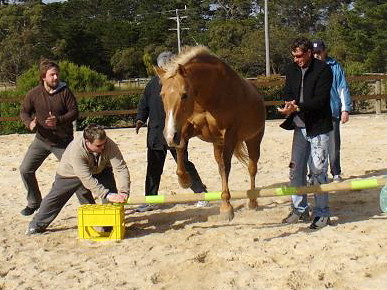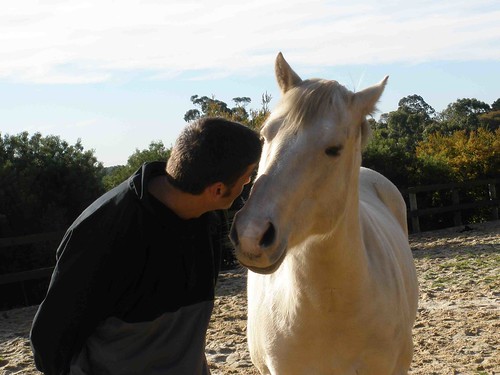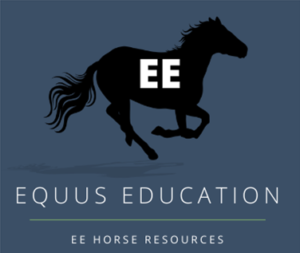 EquiCARE is an Equine After Care and Nursing Service for Horse Owners of Melbourne. Started in July 2011, EquiCARE has helped several horse owners and their ponies with various problems and procedures. As a horse owner herself, Morgan understands how much horse ownership can affect one’s bank balance.
EquiCARE is an Equine After Care and Nursing Service for Horse Owners of Melbourne. Started in July 2011, EquiCARE has helped several horse owners and their ponies with various problems and procedures. As a horse owner herself, Morgan understands how much horse ownership can affect one’s bank balance.
From Post Injury Rehabilitation to attending a Farrier Visit when owners can’t get there, EquiCARE was developed to offer a wide variety of services for horse owners at affordable prices.
How much of your day/week is related to horses?
Horses are a part of my daily routine! I have 3 horses of my own, Arani the 17 year old Thoroughbred Mare, Pokey the 5 year old Thoroughbred Gelding and G I Joe, the 3 year old Miniature Gelding.
I am down at the paddock twice a day, morning feed up and evening turn out. I couldn’t imagine my world without them!
Working full time as a Veterinary Nurse at a small animal Vet Clinic I devote my early mornings, late evenings, weekends off and Rostered Days Off to my small business, EquiCARE!
In the veterinary nursing field, is it possible for someone to be a full time professional, earning a livable income?
Definitely. When I decided to move toward the Veterinary Nursing industry after years in the Thoroughbred industry I was quite nervous. It was a little difficult to get into a Vet Clinic without a Certificate IV in Vet Nursing, which is the standard qualification, but after searching on www.kookaburravets.com I was lucky enough to find a clinic which provided on the job training and didn’t require the Cert IV.
The pay was significantly less than what I had been paid in the horse industry but as you work yourself up and develop your skills, you will reap the benefits. As an owner of 3 very HUNGRY horses living on a Vet Nurse wage, I still manage to pay the bills and feed myself, which is a BONUS!
How did the idea for EquiCARE come about?
In November 2007, a month before I was due to fly over to the United States to complete a secondment at Coolmore America for 6 months, my mare Arani had a nasty paddock accident. For some unknown reason she had taken fright and ended up entangled in a wire fence. This accident left Arani with horrible injuries including a severed jugular vein and nasty lacerations to her cannon and knee, leaving bone exposed.
Arani was transferred to ICU at Muswellbrook Vet Hospital where she was treated and then was transported back to Coolmore for rehabilitation. Arani required daily bandage changes, antibiotics and anti inflammatories for months. Had I not worked under an amazing generous man in Peter O’Brien at Coolmore Australia, I would have been lost. How on earth would I have managed to nurse Arani’s injuries from all the way over in America?
So Arani was my inspiration behind EquiCARE! I wanted to create a business that offered horse owners help when they can’t be there or if they are just not comfortable with the procedure their horse requires. I learnt as much as I could from professionals in Kentucky (they are amazing) and since then have completed my Certificate 3 in Equine Nursing and am currently completing my Diploma of Vet Nursing.
These qualifications together with my previous Equine Studies and experience gives my clients the peace of mind that their horse is in safe hands!
Any advice for those interested in pursuing a similar career?
I would highly recommend the National Centre for Equine Education (NCEE). I have completed my Diploma in Equine Stud Management (formally Diploma in Horse Breeding) and Certificate III in Equine Nursing at the NCEE and couldn’t rate them highly enough.
I was also lucky enough to be awarded a scholarship to the Irish National Stud to continue my studies, that’s how devoted the NCEE are to their students’ careers. It may seem daunting for horsey girls to pack up and leave home to head to the country, but I did it, and have no regrets! Best thing I have ever done!
Is there anything else with horses you’d love to learn about or try?
I am obsessed with learning and developing new skills. My work colleagues actually think I am a little weird. I often attend seminars and conferences to expand my knowledge in the Equine Industry as well as the Small Animal Industry.
I am very intrigued about how light therapy helps horse injuries. There was a young lady, about my age who I met whilst living in Kentucky who had a qualification in Equine Therapy. Her daily job was to visit horses and use either light therapy or magnetic therapy to assist in injury rehabilitation. Apparently these types of therapy can speed up the healing process! I would love to complete a short course and maybe one day offer these therapies through EquiCARE!
Favourite horse memory?
Wow…there are so many to choose from. What would probably take the cake would be becoming reunited with a very special horse! Whilst employed at Coolmore Australia I had the privilege of working with hundreds of adorable well bred foals, one of which was a ‘stand out’.
He was sired by Fastnet Rock out of a mare called Pokey Hill. This little colt was one of those ‘friendly foals’, you know, the ones we love to scratch under the chin on the feed run. Normally this may last a while until they start to realise that they have it over you and then they turn into absolute buggers.

‘Pokey’, as I decided to call him, did not. He remained the cool, calm and collected little foal who would sit there and pose in photos with you while his mum was over the other side of the paddock. He also loved ‘shaking hands’, as seen in the picture! ‘Pokey’ was weaned, prepped for Yearling Sales, taken to Sydney Easter Sales and sold for a whopping $200,000.
He was bought by Dynamic Syndications and spent his racing years under Graeme Rogerson and Ken Parsons Stables. Over the years I would google his name, just to see what he was up to and was thrilled to see he had won a race! What a Champion!
In October last year, the time came again that I thought of my special 4 legged friend and thought I’d google him once more. I found the number of his trainer, Ken and gave him a call. Pokey had been retired due to developing EIPH (Exercise Induced Pulmonary Haemhorrage), and he was up for sale. I didn’t even think twice. He was coming home.

I purchased Pokey for $1,500 (a lot better than $200,000) and he arrived just before my 27th Birthday. I could not have asked for a better present. My mate and I were reunited and since then we have had the best time rekindling our friendship in and out of the saddle! (although things aren’t exactly the same now that he is 17hh!!)
Future goals?
I would love to be able to continue developing EquiCARE and helping Horse Owners and their ponies. My ultimate dream is to eventually purchase some land and set up a n Equine Rehabilitation Centre so horses can come to me as well as EquiCARE going to them.
Best thing about your sport/profession?
The qualities I love the most about Equine Nursing is being outdoors and helping the most beautiful creature on earth. Even if it’s just a bandage change or a quick needle, I walk away thinking…’Yep, I am helping that little pony feel better.’ That makes me feel on top of the world!



